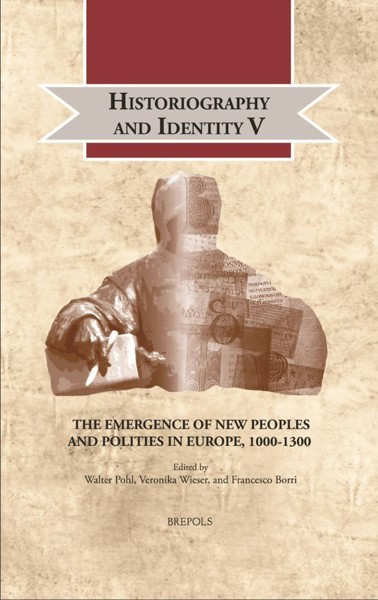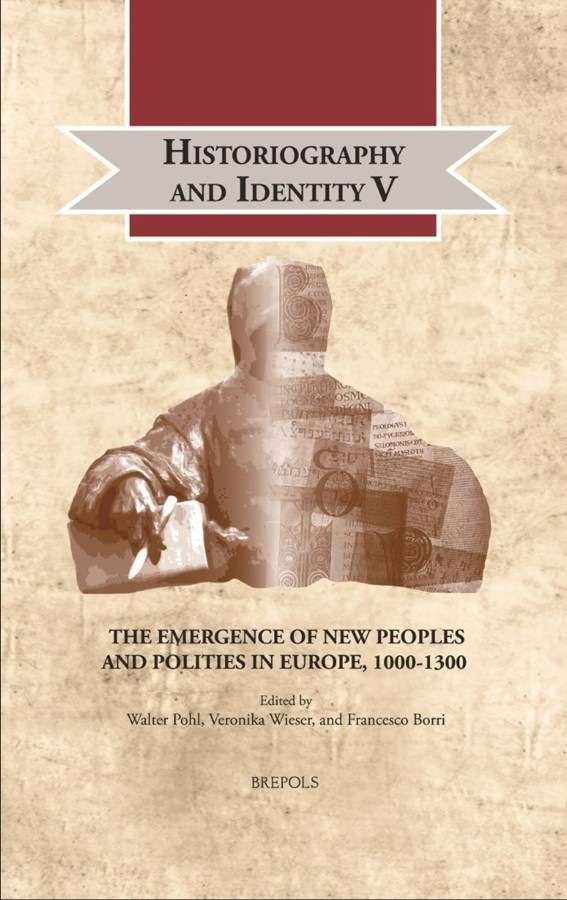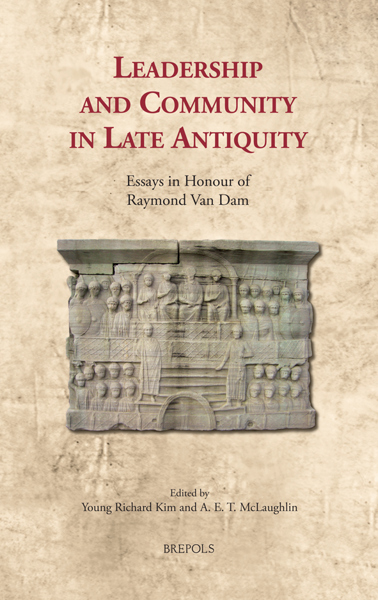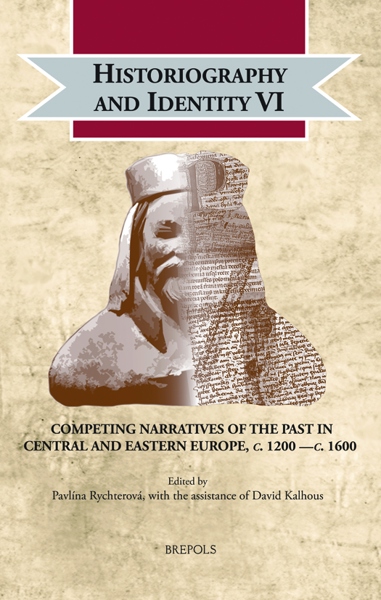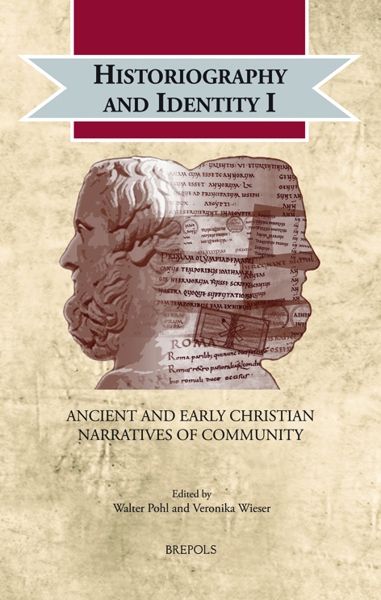
Historiography and Identity V: The Emergence of New Peoples and Polities in Europe, 1000-1300
Walter Pohl, Veronika Wieser, Francesco Borri (eds)
- Pages: xiv + 501 p.
- Size:156 x 234 mm
- Illustrations:2 b/w, 9 maps b/w
- Language(s):English
- Publication Year:2023
- € 125,00 EXCL. VAT RETAIL PRICE
- ISBN: 978-2-503-58849-0
- Hardback
- Available
- € 125,00 EXCL. VAT RETAIL PRICE
- ISBN: 978-2-503-58850-6
- E-book
- Available
Provides an overview of several fundamental texts in which identities in the new Christian kingdoms were negotiated, and examines from a comparative perspective the many different strategies of identification they employed, from the Shetlands to the Kievan Rus’.
“The presented volume will certainly be a valuable addition to the publishing series that present the history of medieval Northern, Central and Southern Europe to English-speaking readers. But it also has an important methodological reflection to offer to researchers interested in today's key topic of the identity of medieval communities across Europe. Drawing attention to the multitude of entangled identities hidden in chronicles is a tip that can be used by researchers of any period and society, not only medieval Europe. Although the studies included in this volume are of a particular nature, the conclusions drawn from them are of universal importance.” (Przemysław Wiszewski, in H-Soz-Kult, 18.10.2023)
"In any event, Pohl, Wieser, and Borri, as well as all contributors to this volume, have provided a welcome and valuable service to raising, advancing, and challenging understandings of medieval historiography in northern and eastern Europe." (Florin Curta, in The Medieval Review, 24.10.07)
"Neben der Frage nach dem Zusammenhang von Geschichtsschreibung und Identitätsbildung, sei es nun durch Eigen- oder Fremdzuschreibungen und ihre Instrumentalisierung in späteren Jahrhunderten, behandeln die meisten Beiträge auch klassische Fragen der Quellenkritik: Fragen nach Autorschaft, Entstehungszeit und -kontext, nach Textgenese und möglichen Vorlagen. Der Band bietet somit nicht nur einen wertvollen Beitrag zur Identitätsforschung, sondern grundsätzlich auch zur Geschichtsschreibung in Nord- und Osteuropa." (Anna C. Nierhoff, in Deutsches Archiv für Erforschung des Mittelalters, 81/1, 2025, p. 305)
« En définitive, les différents articles rassemblés dans cet ouvrage présentent l’intérêt de montrer la complexité du processus de construction historiographique des identités nationales et de donner un aperçu des recherches récentes sur des sources et des pays qui ne sont pas forcément tous bien connus. » (Thomas Ledru, dans Le moyen âge, 131/2, 2025, p. 631)
Walter Pohl is Emeritus Professor of Medieval History at the University of Vienna and former Director of the Institute for Medieval Research at the Austrian Academy of Sciences.
Veronika Wieser works as a postdoctoral researcher at the Institute for Medieval Research at the Austrian Academy of Sciences.
Francesco Borri, Department of Humanities, Ca' Foscari University of Venice.
In many countries in Northern and Eastern Europe, the period after 1000 saw the emergence of new Christian kingdoms. This process was soon reflected in works of historiography that traced the foundation and development of the new polities. Many of these texts had a lasting impact on the formation of political, ethnic, and religious identities of these states and peoples.
This volume deals with some of these earliest histories narrating the past of the new polities that had emerged after 1000 in Northern, East Central, and Eastern Europe, as well as in the Adriatic regions. They have often been understood as ‘national histories’, but a closer look brings out the differences in their aims and construction. One question addressed here is to what extent these historians built on models of identification developed in earlier historiography. The volume provides an overview of several fundamental texts in which identities in the new Christian kingdoms were negotiated, and of recent research on these texts.
Introduction: The Historiography of New Peoples and Polities in Northern and Eastern Europe— WALTER POHL and VERONIKA WIESER
Scandinavian and Baltic Origins
Adam of Bremen’s Use of Earlier History
IAN WOOD
National Identity in Scandinavian Chronicles (Saxo and Snorri)
SVERRE BAGGE
Orkney, Óláfr Tryggvason, and the Conversion to Christianity
ROSALIND BONTÉ
Biblical Motifs and the Shaping of Ethnic Categories in the Chronicle of Henry of Livonia
STEFAN DONECKER and PETER FRAUNDORFER
Cosmas of Prague, the Gesta principum Polonorum, and their Western Contexts
The Legenda Christiani, the Chronica Bohemorum, and the Bohemian Slavs
PAVLÍNA RYCHTEROVÁ
Space and Identity in the Chronica Bohemorum of Cosmas of Prague
JAN HASIL
Helmold of Bosau and our Reading of his Chronica Slavorum
JAN KLÁPŠTĚ
Creating Dynastic Identity: Gallus Anonymus’s Chronicle
ZBIGNIEW DALEWSKI
‘By the Crown of My Empire! The Things I Behold Are Greater than I Had Been Led to Believe!’: The Narrative Pattern Sheba Visits Salomon in Medieval Narratives (Gallus’s Chronicle, Chronicon Salernitanum, and Pèlerinage de Charlemagne)
JACEK BANASZKIEWICZ
Hungarian Origins and their Political Uses
Hungarian Origins and Carolingian Politics in Regino of Prüm’s Chronicle
MAXIMILIAN DIESENBERGER
Us and Them: The Description of Foreigners and Indigenous Peoples in Master P.’s and Simon of Kéza’s Gesta (Thirteenth Century)
DÁNIEL BAGI
Christian Identity versus Heathendom: Hungarian Chroniclers Facing the Pagan/Nomadic Past and the Present
LÁSZLÓ VESZPRÉMY
Histories of Origins from the Adriatic and the Balkans
Circles of Identity: The Narratives of Thomas of Split and Domnius de Cranchis of Brač
NEVEN BUDAK
Grado as Aquileia Nova and Split as Salona Nova? Local Historiography and Local Identity
PETER ŠTIH
Patria Venecia: John the Deacon’s Search for Venetian Origins
FRANCESCO BORRI
The ‘Dioclean Tradition’ in Serbian Literature of the Early Thirteenth Century
ALEKSANDAR UZELAC
The Rus’ Primary Chronicle, the Old Testament, and the Byzantine Background
The Debate over Authorship of the Rus’ Primary Chronicle: Compilations, Redactions, and Urtexts
DONALD OSTROWSKI
Creating Time, Forging Identity, Building a State:
The Primary Chronicle of Rus’
OLEKSIY TOLOCHKO
Historiography of the New Europe: Comparative Perspectives
WALTER POHL
Index
